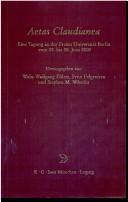| Listing 1 - 6 of 6 |
Sort by
|
Book
ISBN: 9781107013438 1107013437 9781139004152 1139411470 1107229502 1139422839 9786613659934 1139419811 1139421867 1139423908 1139417762 1139004158 128068299X 9781139423908 9781280682995 9781139421867 9781139419819 9781107229501 9781139411479 6613659932 9781139422833 9781139417761 Year: 2012 Publisher: Cambridge ; New York : Cambridge University Press,
Abstract | Keywords | Export | Availability | Bookmark
 Loading...
Loading...Choose an application
- Reference Manager
- EndNote
- RefWorks (Direct export to RefWorks)
The historical importance of Claudian as writer of panegyric and propaganda for the court of Honorius is well established but his poetry has been comparatively neglected: only recently has his work been the subject of modern literary criticism. Taking as its starting point Claudian's claim to be the heir to Virgil, this book examines his poetry as part of the Roman epic tradition. Discussing first what we understand by epic and its relevance for late antiquity, Catherine Ware argues that, like Virgil and later Roman epic poets, Claudian analyses his contemporary world in terms of classical epic. Engaging intertextually with his literary predecessors, Claudian updates concepts such as furor and concordia, redefining Romanitas to exclude the increasingly hostile east, depicting enemies of the west as new Giants and showing how the government of Honorius and his chief minister, Stilicho, have brought about a true golden age for the west.
Epic poetry, Classical --- History and criticism. --- Claudianus, Claudius --- Criticism and interpretation. --- Rome --- In literature. --- History and criticism --- Claudien --- Claudius Claudianus --- Claudiano, Claudio --- Claudian --- Claudià, Claudi --- Klavdian --- Клавдиан --- Klavdian, Klavdiĭ --- Клавдиан, Клавдий --- Pseudo-Claudianus --- Arts and Humanities --- History
Book
ISBN: 9781107123694 1107123690 1108916775 1316421791 9781316421796 9781107565418 Year: 2021 Publisher: Cambridge Cambridge University Press
Abstract | Keywords | Export | Availability | Bookmark
 Loading...
Loading...Choose an application
- Reference Manager
- EndNote
- RefWorks (Direct export to RefWorks)
The oration presented in this volume is critical to our knowledge of Constantine's early career and covers Maximian's rebellion, Constantine's claim of descent from Claudius II and his vision of Apollo. Written in AD 310, two years before Constantine's capture of Rome and his acceptance of Christianity, the speech gives a unique insight into the evolution of an imperial persona. This commentary examines the literary context of the panegyric and the role of the classical literary and rhetorical tradition in the recreation of Constantine's image. From the outset, the orator praises Constantine as separate from the imperial college: a deus praesens, god manifest, to the people of Gaul. He uses Lucan and Caesar to link Maximian's bid for power with the civil war between Caesar and Pompey while Vergilian allusion associates Constantine with Augustus.
Speeches, addresses, etc., Latin --- History and criticism --- Constantine --- Panegyrici Latini. --- Rome --- History --- Sources. --- Constantijn, --- Constantin, --- Constantin --- Constantine, --- Constantino --- Constantinus Flavius Valerius Aurelius, --- Constantinus --- Constantinus, --- Costantino --- Costantino, --- Flaviĭ Valeriĭ Avreliĭ Konstantin, --- Flavius Valerius Aurelius Constantinus Augustus, --- Flavius Valerius Aurelius Constantinus, --- Flavius Valerius Constantinus, --- Konstantin, --- Konstantin --- Kōnstantinos, --- Kōnstantinos --- Konstantyn, --- Kostandianos --- Κωνσταντίνος, --- Флавий Валерий Аврелий Константин, --- Константин --- Константин, --- Flavije Valerije Konstantin --- Duodecim panegyrici Latini --- Panegyrici veteres --- Oratores panegyrici --- Rim --- Roman Empire --- Roman Republic (510-30 B.C.) --- Romi (Empire) --- Byzantine Empire --- Rome (Italy)
Digital
ISBN: 9781139004152 Year: 2012 Publisher: Cambridge Cambridge University Press
Abstract | Keywords | Export | Availability | Bookmark
 Loading...
Loading...Choose an application
- Reference Manager
- EndNote
- RefWorks (Direct export to RefWorks)
Thematology --- Rome
Book
ISBN: 1316421791 1108916775 Year: 2021 Publisher: Cambridge : Cambridge University Press,
Abstract | Keywords | Export | Availability | Bookmark
 Loading...
Loading...Choose an application
- Reference Manager
- EndNote
- RefWorks (Direct export to RefWorks)
The oration presented in this volume is critical to our knowledge of Constantine's early career and covers Maximian's rebellion, Constantine's claim of descent from Claudius II and his vision of Apollo. Written in AD 310, two years before Constantine's capture of Rome and his acceptance of Christianity, the speech gives a unique insight into the evolution of an imperial persona. This commentary examines the literary context of the panegyric and the role of the classical literary and rhetorical tradition in the recreation of Constantine's image. From the outset, the orator praises Constantine as separate from the imperial college: a deus praesens, god manifest, to the people of Gaul. He uses Lucan and Caesar to link Maximian's bid for power with the civil war between Caesar and Pompey while Vergilian allusion associates Constantine with Augustus.
Speeches, addresses, etc., Latin --- History and criticism. --- Maximian, --- Diocletian, --- Diocletianus, --- Dioklecijan, --- Diokletian, --- Diokghetianos, --- Diocleziano, --- Diocleciano, --- Cayo Aurelio Valerio Diocleciano, --- Massimiano Herculius, --- Massimiano, Marco Aurelio Valerio, --- Maximianus, Aurelius Valerius, --- Maximianus, Marcus Aurelius Valerius, --- Panegyrici Latini. --- Duodecim panegyrici Latini --- Panegyrici veteres --- Oratores panegyrici --- Rome --- Rim --- Roman Empire --- Roman Republic (510-30 B.C.) --- Romi (Empire) --- Byzantine Empire --- Rome (Italy) --- History --- Sources.
Digital
ISBN: 9781316421796 Year: 2021 Publisher: Cambridge Cambridge University Press
Abstract | Keywords | Export | Availability | Bookmark
 Loading...
Loading...Choose an application
- Reference Manager
- EndNote
- RefWorks (Direct export to RefWorks)


ISBN: 9783110928846 9783598730207 Year: 2021 Publisher: Leipzig B. G. Teubner
Abstract | Keywords | Export | Availability | Bookmark
 Loading...
Loading...Choose an application
- Reference Manager
- EndNote
- RefWorks (Direct export to RefWorks)
| Listing 1 - 6 of 6 |
Sort by
|

 Search
Search Feedback
Feedback About UniCat
About UniCat  Help
Help News
News